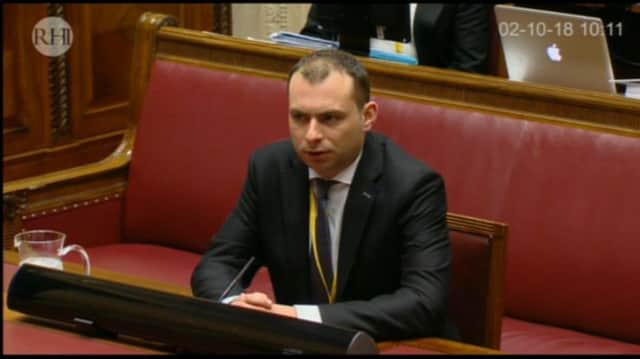RHI Inquiry: I believe Stormont knew of key RHI flaws, says installer


Alan Hegan of Hegan Biomass Ltd told Sir Patrick Coghlin’s inquiry that he could not accept that the department responsible for energy did not know that the cost of biomass fuel was less than what it was paying to incentivise the use of boilers.
In forthright testimony to the RHI Inquiry, Mr Hegan said of the fuel being cheaper than the tariff: “This was not a secret. Everybody was widely aware of this – but this was accepted.”
Advertisement
Hide AdAdvertisement
Hide AdHe said that tariffs in GB – where there were cost controls to stop unlimited burning – were also higher than the cost of fuel to speed uptake.
Stormont’s Department for the Economy has told the inquiry that those who knew that the subsidy was higher than the cost of fuel did not alert it to that fact. It described this as a “conspiracy of silence”.
Mr Hegan said: “I say that’s a similar argument to saying [major gas suppliers] firmus and Phoenix Natural Gas have a conspiracy of silence that they’re not telling the department what price natural gas is...there’s no conspiracy of silence as to the price of pellets.
“As several people have alluded to, Google’s a wonderful thing if they don’t know. But I’m actually astounded – if this is true – that the energy department in [Stormont] would not know the price of fuel on a scheme that they’re rolling out. It’s the equivalent of saying ‘we don’t know what price diesel is; we don’t know what price petrol is’.”
Advertisement
Hide AdAdvertisement
Hide AdMr Hegan said that he never thought to tell officials about the price of biomass fuel because he believed “this was government policy”, adding: “This was seen as a certified upright government scheme...I was under the illusion, shall we say, that there’s people a lot more qualified and a lot more intelligent than I was that had made these decisions and we were out there as a business to implement this.”
He said that he would have seemed “a fool” if he had pointed out to civil servants what price biomass fuel was, adding: “It would be like me ringing up the department at the minute and saying ‘do you know what price mains gas is?’
“I can’t fathom that they wouldn’t understand the price of pellets in a scheme that they’re rolling out - this is a £600m, £700m scheme and they don’t know what price the fuel is? It can’t be right.”
In his written evidence, Mr Hegan said: “It is my steadfast opinion that DETI was aware but chose to ignore the issues, in their quest to roll out the programme.”
Advertisement
Hide AdAdvertisement
Hide AdSir Patrick put to him the evidence of an energy expert who told the inquiry that energy efficient systems were unattractive because the 99kwh boilers were so lucrative, with no limits on what could be earned. Mr Hegan said: “Yeah. Well, it was the way in which the scheme was designed [which] led to the proliferation of 99kwh boilers.”
Sir Patrick asked: “Why do you think it took so long for that to dawn on the people who designed the scheme?” After a lengthy pause, Mr Hegan said: “I believe they knew.”
Sir Patrick said: “If you believe they knew, what do you think the motive was to have a scheme that was extremely monetarily attractive – [that] offered you a profit as opposed to an incentive – what was the motive for that as opposed to one that incentivised an energy effective solution?”
Mr Hegan said he believed it was deliberately designed to be ultra-attractive to encourage uptake, as is common with green energy incentives, but that a key flaw had been the failure cut that rate as uptake quickened. He said that when questions were asked of officials “nobody wanted to hear it; nobody cared”.